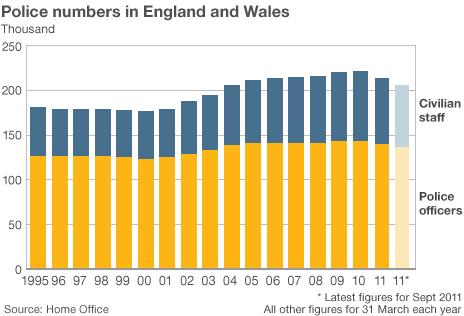Theresa May defends police relationship after heckles
- Published
- comments
Home Secretary Theresa May: "Let's stop pretending the police are being picked on"
Home Secretary Theresa May has denied her relationship with the police is beyond repair after she was heckled at the Police Federation conference.
She used her speech to rank and file officers to justify budget cuts of 20% in England and Wales, and some of the most radical reforms in 30 years.
Mrs May said police needed to "share" in government austerity measures but said change was in forces' interest.
She told the BBC it was right to stick to the "challenging" plans.
"I've told the federation conference as it is - which is that as a government we do have to deal with the deficit, and that means that policing has to take its share of the cuts," Mrs May said in an interview with the BBC's James Landale.
"It is necessary for us to look at this, for the good of policing for the future, and looking at how we can ensure police officers are able to do the job they and the public want them to do."
Some officers held up placards reading "enough is enough" as Mrs May came on stage and she was heckled during the question and answer session that followed.
BBC home affairs correspondent Danny Shaw <link> <caption>tweeted </caption> <url href="http://twitter.com/#!/DannyShawBBC" platform="highweb"/> </link> that the home secretary had apparently been reluctant to be photographed or filmed directly in front of a sign on stage saying "20% cuts are criminal".
Mrs May, who went on to give her speech to one side of the sign, said afterwards: "It's not a view that I agree with, it's the view that the Police Federation has put forward."
She was clear that police forces needed to explore the idea that some roles were suited to private sector contracting, but denied she was responsible for creeping privatisation.
The home secretary said: "Well, I've been very clear about where the line is drawn today, the picture that the Police Federation have put out today is not one that I recognise, and it is not one that is going to occur.
"But it is right that police forces, in looking at their budgets, should say are there some things we do where it would be better for the private sector to do them."
The federation is unhappy with the government's proposed radical overhaul of pay and conditions, and a challenge to the existing model of policing with the privatisation of an increasing number of jobs.
In her speech, Mrs May reassured officers that crime fighting duties would not be taken on by the private sector.
She told the Bournemouth conference: "It will only ever be police officers who make arrests; it will only ever be police officers who lead investigations; and it will only ever be police officers who direct policing operations."
But she added: "It's my job to do what is right for policing and right for the country and it's my job to reform policing so that it's fit to face the future.
"Less paperwork, more police work. More power for the public, less power for the bureaucrats and freeing the best police officers in the world to fight crime."
Officers needed to "stop pretending" they were being "picked on", she added. "Every part of the public sector is having to take its share of the pain."
Cheers and applause broke out in the question and answer session as one federation member, Dave Bennett, challenged Mrs May over the proposed pay cuts for new officers and told her: "Home secretary, I believe you are a disgrace".
In his address, Police Federation chairman Paul McKeever said the home secretary was "on the precipice of destroying" a police service admired throughout the world.
He told the conference: "We are about to go through some fundamental change that will alter policing for ever."
"This is a bad deal for police officers, it's a bad deal for the service and most of all it's a bad deal for the British public."
Mr McKeever added that proposed wage cuts were "over and above" other public sector workers and "palpably unfair".
And he cautioned against cutting more officers.
"The reality is the only thing you're going to get more of with less by 20% is more crime, more anti-social behaviour, and more disorder."
Sam Roberts from North Wales Police asked the home secretary if she had ever told a parent that their child has died
A review by former rail regulator Tom Winsor proposed a fundamental shift in how the police are paid - awarding the officers who are taking the greatest risks in front line jobs, while cutting payments and allowances.
It also suggested ending retirement after 30 years service and said potential high achievers should be allowed to enter at inspector level, rather than rise through the ranks.
Mrs May said police would remain the best paid of emergency services but the right to strike in future was "off the table" because "keeping our communities safe is simply too important".
She also announced she would extend police powers to enable officers to prosecute traffic offences where the defendant does not enter a plea or turn up at court. An announcement will also be made in the summer on powers that will give forces further powers "to prosecute a wider range of low-level offences".

- Published16 May 2012
- Published16 May 2012
- Published10 May 2012
- Published29 March 2012
- Published15 March 2012